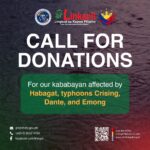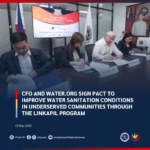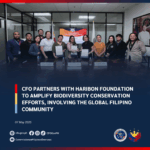Dr. Candari wrote an article entitled, “Medical missions to the Philippines may disappear” and stated, “The medical mission is the vanguard humanitarian endeavor of any Filipino medical and civic organizations. It shows no limit in their dedication, kindness, sympathy, charity, and genuine love for the poor people in our homeland” (Global Balita, August 16, 2012).
SUMMIT MEETING
A SUMMIT MEETING of Filipino – American physician leaders, para-medical, other health advocates, and the Foreign Medical-Surgical Mission (FSMM) will take place in Richmond, Virginia, on September 19, 2015. The North Central Virginia Association of Philippine Physicians Foundation (NC-VAPP) in tandem with the 32nd Annual Convention of the Foundation will host. Dr. Rosario Laserna, President of SPSA is the primary innovator of the Summit Meeting. The fundamental agenda of the Summit, led by both Dr. Boy Abay and Dr. Daniel C. Fabito, is to discuss several issues affecting Filipino-American physicians and organizations conducting surgical and medical missions to the Philippines. It is a crusade for unity of Fil-Am Expats in the U.S. and Canada, to embark upon a strong, coordinated, and continued commitment with a unified one voice to serve our poor Kababayan in the spirit of Bayanihan.
Government officials in Health Departments in the Philippines are invited. Jose L. Cusia, Jr., the Ambassador of the Republic of the Philippines to the United States, will attend.
MEDICAL MISSION
We have relentlessly been involved with humanitarian medical services for several years. Many Filipino American doctors, nurses, and other non-medical volunteers are organized for this purpose. Missionaries have helped the poorest in the different regions in the Philippines, who have otherwise lacked medical care their entire lives. Roughly 23.75 million of the Philippine population lacks medical care. It is sad to say Good Samaritans shall be eventually disappear. We are now in retirement; at our age, we are the “vanishing generation.”
Medical mission is an initiative with broad-based community support both in the U.S. and in the Philippines. Various provincial and regional or district hospitals throughout the country provide the bulk of government-sponsored patient care. The Department of Health has done an excellent job on running these hospitals considering the many budgetary and manpower constraints. However, the rapidly growing population and an ever-increasing patient load have stressed hospital resources. Extending help to these hospitals by non-government organizations from the U.S. can alleviate some problems. The concept of “Adopt a Hospital” ame about during the leadership of former Secretary of Health Dr. Enrique Ona. According to Dr. Eustaquio Abay, there are roughly 475 published medical missions to the Philippines from the United States, with additional mission groups from Germany, Australia and elsewhere.
We ask you for support and to join medical missions: “We want to shatter- the way you think about the world. We want to transform – the way you see people and the way people see God. We want to see hearts healed, minds changed, and bodies mended.” We hope our Philippine government will finally realize the missioners’ efforts and better healthcare access for the poor. We certainly hope our Philippine government will finally realize the Filipinos Medical Mission is a great potential, in many ways, to our country.
There was a time when Fil-Am doctors cancelled medical missions to the Philippines. On June 21, 2012, the Republic Act No 8981 created a massive negative response from individuals and organizations involved in medical missions to the Philippines.
The problems encountered by these groups are frustrating. The regulatory system of Philippine government as well as the non-cooperation from local Filipino physicians to are blatantly saying they are not welcome.
In unison and with a groundswell of support especially from the Filipino Overseas Commission (CFO) of Manila, Fil-Am Samaritans fought hard, and the PRC suspended the implementation of such unwarranted regulations.
At the present, however, paper requirements are still very time-consuming for missionaries to apply. It is not an easy process.
There process must improve. We hope it will be easier, similar to other third world countries where missionaries are far more welcome.
URGENT NEED FOR A HEALTH ATTACHE
A Health Attaché Officer is needed in the Philippine Embassy in Washington, DC, whose function is to be a “ONE STOP” office that will facilitate easier paperwork relative to missionaries, shipment of equipment and medical supplies, and to reduce bureaucratic impediments in the Bureau of Custom (BOC). The Health Attaché office will be the liaison to the different government agencies, bureaus and departments, as well as NGOs and medical organization. Although this request for a Health Attaché officer has been presented to the Philippine government, nothing has developed. Our humanitarian journey ahead is almost a mission impossible with so many difficulties.
DONATIONS OF EQUIPMENT AND HOSPITAL SUPPLIES
By the same token, one other huge obstacle is we are subjected to authoritarianism and non-cooperation from the leaders of our country. One of the most vexing problems is our difficulty in getting duty-free and tax-free exemptions from the (BOC). Although the former Secretary Dr. Enrique Ona has somewhat resolved this hurdle, this policy is not yet very clear and difficulties still exist.
Rather than encouraging missions and donations, the Government in Manila is thwarting such efforts. It may not be the intent but is the result of the plethora of rules that impede our efforts, time and money and eventual delay of delivery to intended hospitals as venues of medical missions.
President Aquino must support our project; he must bring us to the righteous path of Daan Matuwid, Walang Corrupt Walang Mahirap. Mr. President, you should know this additional philanthropic problem – a barrier to equipment donations – dampens our interest of donating medical equipment to our country. Mr. President, tear down this barrier. Make it easy for us to send humanitarian donations. Remove the bureaucratic wall in the BOC. Corruptions in the Bureau of Customs still exist. Media reports has been known of hundreds of containers were lost. The delay of storage at the port of entry in Manila costs huge amount of money.
We are thankful the CFO is behind us. He champions the cause of medical missionaries and is sensitive to the needs of our poor fellow kababayan, Fil-Ams and other patriotic Filipinos around the globe. But still we wish the PRC, DOH, and all the powers-that-be can make medical missions to the Philippines more attractive, convenient, and safer. After all, the beneficiaries are deserving but neglected fellowmen.
To repeat, this SUMMIT meeting is the unification of the expat “COMING TOGETHER in UNITY & GIVING BACK.”
God Bless!
Source:
Cesar D. Candari, MD FCAP Emeritus
Daniel C. Fabito , MD FACS FPCS






